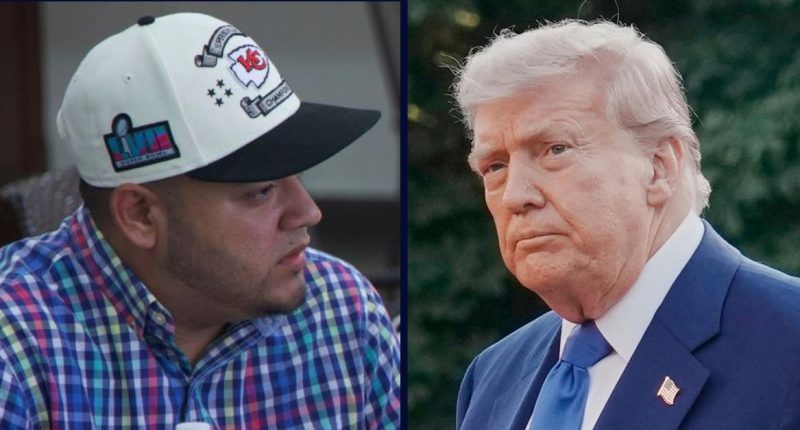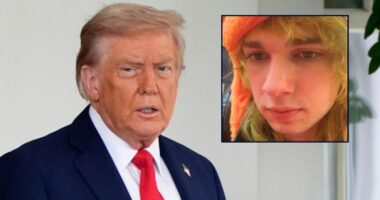Share this @internewscast.com
On the left, there’s Kilmar Abrego Garcia, a native of El Salvador who resided in Maryland before being deported by the Trump administration. He’s pictured speaking in a hotel restaurant in San Salvador, El Salvador, on April 17, 2025 (Photo courtesy of Press Office Sen. Van Hollen, via AP). On the right, President Donald Trump is seen arriving for a formal dinner at the Paleis Huis ten Bosch before the NATO summit in The Hague, Netherlands, on June 24, 2025 (AP Photo/Markus Schreiber).
The legal team representing Kilmar Abrego Garcia has filed a motion to have his criminal case in Tennessee dismissed, arguing that the charges against him were filed out of “revenge.”
In their motion, Garcia’s lawyers noted that attempts to dismiss cases based on “vindictive and selective prosecution” typically do not succeed. However, they argued that if ever there was a case justifying such a dismissal, this would be it.
Garcia’s confrontation with the Trump administration has come to symbolize the contentious deportation policies of the presidency. Despite a 2019 court ruling preventing his return to El Salvador, he was sent back in March. Subsequently, he filed a lawsuit against the administration to ensure his return to the U.S.
This situation drew attention to diplomatic relations, political maneuvers, and questions regarding judicial authority, with President Donald Trump and his Cabinet members blocking efforts for his repatriation. Abruptly, Garcia did return, only to face migrant smuggling allegations in another case which his legal team has deemed a “sham.”
In the paperwork submitted on Tuesday, Garcia’s lawyers argue that the Tennessee charges are intrinsically linked to his Maryland case, which challenges the legitimacy of his “unlawful removal.”
“The government is attempting to use this case — and this Court — to punish Mr. Abrego for successfully fighting his unlawful removal,” they wrote to U.S. District Judge Waverly D. Crenshaw Jr., a Barack Obama appointee. “That is a constitutional violation of the most basic sort. The Indictment must be dismissed.”
They further allege that the government has undertaken an “unprecedented retribution campaign” against Abrego Garcia — with the administration seeking, especially given the high-profile nature of his immigration case, to paint him as a criminal.
“While the government waged this public campaign to discredit and punish Mr. Abrego, it also sought to use its criminal investigative authority for the same purpose,” the lawyers wrote. “In late April 2025, the government opened a new criminal investigation into Mr. Abrego, the better to support its arguments against him in the court of public opinion.”
Abrego Garcia’s lawyers say the “centerpiece of the government’s fledgling investigation” into allegedly smuggling undocumented migrants is a November 2022 traffic stop for which he was neither charged nor cited. “The government has gone to extreme lengths to make a criminal case against Mr. Abrego,” the lawyers add, pointing to alleged co-conspirators they contend are unreliable. Abrego Garcia arrived in Tennessee on June 6, and Trump administration officials’ public actions that day, his lawyers argue, underscore what the case is all about.
From the memorandum, at length:
The government’s statements that day make plain that this case was initiated to punish Mr. Abrego for challenging his removal and to support high-ranking government officials’ false claims that deporting him to El Salvador had been the right thing to do. Attorney General [Pam] Bondi, who called a press conference to announce the charges, gloated that “[t]his is what American justice looks like,” and unethically opined that Mr. Abrego would be found guilty, sentenced, and then “returned to his home country of El Salvador.” Deputy Attorney General Todd Blanche went on television to say that the government began “investigating” Mr. Abrego only after “a judge in Maryland…questioned” the government’s decision to deport him, found that it “had no right to deport him,” and “accus[ed] us of doing something wrong.” He added: “[T]he reason [Mr. Abrego] was returned and the facilitation that brought him back here is not a Judge; it’s an arrest warrant issued by a grand jury.” President Trump chimed in as well, lauding DOJ for its “decision” to prosecute Mr. Abrego and characterizing the government’s motive: “[M]aybe they just said, look…these judges they want to try and run the country…. I could see a decision being made—bring him back, show everybody how horrible this guy is. And frankly we have to do something because the judges are trying to take the place of a President that won in a landslide.”
Abrego Garcia’s lawyers also point to a U.S. Justice Department whistleblower, who “suffer[ed] grave career consequences as a result” of releasing documents purportedly showing Trump administration officials’ less-than-firm belief in their case and pushing for Abrego Garcia’s “prompt return” from El Salvador.
To hear his lawyers tell it, the government officials’ public comments venting frustration about Abrego Garcia filing suit to secure his return are proof that the prosecution is “vindictive,” and the fact that Abrego Garcia was targeted — while others in similar situations were not — shows the prosecution is “selective.”
“The government’s naked ante-upping against Mr. Abrego — confirmed in the public statements of numerous high-ranking officials — underscores the unreasonableness of its conduct,” they added.
The Maryland man wants the smuggling case against him dismissed, but if Crenshaw not convinced to go that far, then Abrego Garcia wants the judge to order a hearing to go over his claims. He could be released from criminal custody in Tennessee as soon as Friday once U.S. Magistrate Judge Barbara Holmes’s temporary stay expires, and he is requesting a release order that he be returned to Maryland.
Abrego Garcia’s situation has seen a lot of confusion in recent months, not least because the Trump administration’s various agencies haven’t appeared to be on the same page. At one point, the DOJ implored Holmes not to release Abrego Garcia to ICE out of fear the agency would quickly deport him before the DOJ could finish its prosecution.
It was a shocking about-face as the administration’s stance up until that point had been that even though Abrego Garcia was improperly deported to El Salvador, he was nevertheless rightfully expelled from the U.S.
Abrego Garcia has pleaded not guilty to the charges against him, and his attorneys have decried the government’s actions, arguing they have “flouted rather than followed” orders from both the Nashville-based federal court as well as the Supreme Court.
















